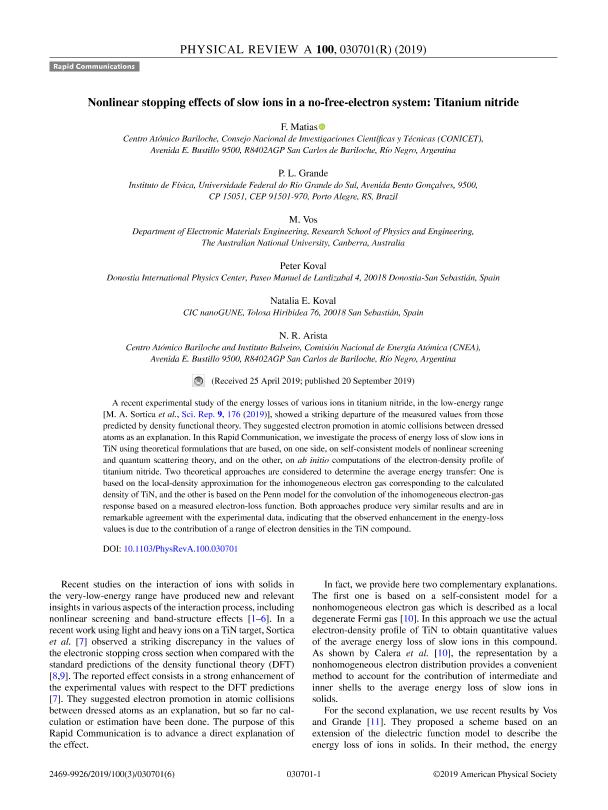Artículo
Nonlinear stopping effects of slow ions in a no-free-electron system: Titanium nitride
Matias Da Silva, Flávio ; Grande, P. L.; Vos, M.; Koval, Peter; Koval, Natalia E.; Arista, Nestor Ricardo
; Grande, P. L.; Vos, M.; Koval, Peter; Koval, Natalia E.; Arista, Nestor Ricardo
 ; Grande, P. L.; Vos, M.; Koval, Peter; Koval, Natalia E.; Arista, Nestor Ricardo
; Grande, P. L.; Vos, M.; Koval, Peter; Koval, Natalia E.; Arista, Nestor Ricardo
Fecha de publicación:
20/09/2019
Editorial:
American Physical Society
Revista:
Physical Review A: Atomic, Molecular and Optical Physics
ISSN:
2469-9926
e-ISSN:
2469-9934
Idioma:
Inglés
Tipo de recurso:
Artículo publicado
Clasificación temática:
Resumen
A recent experimental study of the energy losses of various ions in titanium nitride, in the low-energy range [M. A. Sortica, Sci. Rep. 9, 176 (2019)2045-232210.1038/s41598-018-36765-7], showed a striking departure of the measured values from those predicted by density functional theory. They suggested electron promotion in atomic collisions between dressed atoms as an explanation. In this Rapid Communication, we investigate the process of energy loss of slow ions in TiN using theoretical formulations that are based, on one side, on self-consistent models of nonlinear screening and quantum scattering theory, and on the other, on ab initio computations of the electron-density profile of titanium nitride. Two theoretical approaches are considered to determine the average energy transfer: One is based on the local-density approximation for the inhomogeneous electron gas corresponding to the calculated density of TiN, and the other is based on the Penn model for the convolution of the inhomogeneous electron-gas response based on a measured electron-loss function. Both approaches produce very similar results and are in remarkable agreement with the experimental data, indicating that the observed enhancement in the energy-loss values is due to the contribution of a range of electron densities in the TiN compound.
Palabras clave:
Nonlinear Stopping
,
Slow Ions
,
No-Free-Electron System
,
Titanium Nitride
Archivos asociados
Licencia
Identificadores
Colecciones
Articulos(CCT - PATAGONIA NORTE)
Articulos de CTRO.CIENTIFICO TECNOL.CONICET - PATAGONIA NORTE
Articulos de CTRO.CIENTIFICO TECNOL.CONICET - PATAGONIA NORTE
Citación
Matias Da Silva, Flávio; Grande, P. L.; Vos, M.; Koval, Peter; Koval, Natalia E.; et al.; Nonlinear stopping effects of slow ions in a no-free-electron system: Titanium nitride; American Physical Society; Physical Review A: Atomic, Molecular and Optical Physics; 100; 030701; 20-9-2019; 1-6
Compartir
Altmétricas



